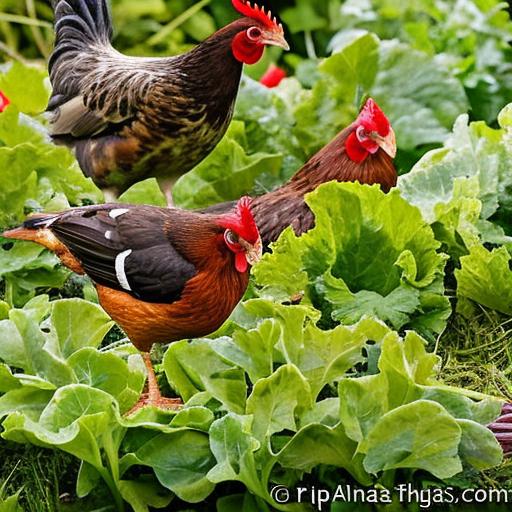Keeping chickens on an allotment has become increasingly popular in recent years, as more people are embracing the idea of urban farming and backyard chicken keeping. Allotments provide a space for individuals to grow their own fruits, vegetables, and flowers, and keeping chickens adds another dimension to this self-sufficiency. In this article, we will explore the benefits of keeping chickens on an allotment, the legal considerations involved, and provide tips for setting up and caring for your chickens.
Key Takeaways
- Allotments are small plots of land used for gardening and growing crops.
- Keeping chickens on an allotment can provide fresh eggs and natural pest control.
- Legal considerations for keeping chickens on an allotment include noise and hygiene regulations.
- Local council regulations may limit the number of chickens allowed on an allotment.
- Choosing the right chicken coop and properly caring for chickens can prevent common problems.
What is an Allotment?
An allotment is a plot of land that is rented out by a local council or private landlord for individuals to use for gardening or farming purposes. The purpose of an allotment is to provide people with limited access to land the opportunity to grow their own produce. Allotments are typically divided into smaller plots, which are then rented out to individuals or families.
Allotments are used for a variety of purposes, including growing fruits, vegetables, herbs, and flowers. They can also be used for keeping livestock such as chickens, rabbits, or bees. Allotments provide a space for people to connect with nature, grow their own food, and enjoy the benefits of outdoor living.
Benefits of Keeping Chickens on an Allotment
There are numerous benefits to keeping chickens on an allotment. One of the most obvious benefits is the availability of fresh eggs. Chickens are prolific layers and can provide a steady supply of eggs for you and your family. Not only are fresh eggs delicious, but they are also more nutritious than store-bought eggs.
Another benefit of keeping chickens on an allotment is natural pest control. Chickens love to eat insects and other pests that can damage your crops. By allowing your chickens to roam freely in your allotment, they will help keep pests under control without the need for harmful pesticides.
In addition to these practical benefits, keeping chickens on an allotment also has environmental benefits. Chickens produce manure, which can be used as a natural fertilizer for your plants. This reduces the need for chemical fertilizers and helps to create a more sustainable and eco-friendly garden.
Legal Considerations for Keeping Chickens on an Allotment
Before you start keeping chickens on your allotment, it is important to consider the legal aspects involved. Each local council may have different regulations regarding the keeping of livestock, including chickens. It is essential to familiarize yourself with these regulations to ensure that you are in compliance with the law.
Zoning laws may dictate whether or not you are allowed to keep chickens on your allotment. Some areas may have restrictions on the number of chickens you can keep or the type of coop you can have. It is important to check with your local council to determine what the specific regulations are for your area.
In some cases, you may need to obtain a permit or license to keep chickens on your allotment. This may involve filling out an application and paying a fee. Failure to comply with these regulations can result in fines or legal issues, so it is important to follow the rules and regulations set forth by your local council.
Local Council Regulations for Keeping Chickens on an Allotment
The specific regulations for keeping chickens on an allotment will vary depending on your local area. It is important to research and understand these regulations before bringing chickens onto your plot.
To find out more information about the regulations in your area, you can contact your local council or visit their website. They will be able to provide you with information about zoning laws, permits, and any other requirements that may be necessary for keeping chickens on your allotment.
Choosing the Right Chicken Coop for Your Allotment

Choosing the right chicken coop is essential for keeping chickens on an allotment. The coop should provide a safe and comfortable environment for your chickens, while also being practical and easy to maintain.
There are several types of chicken coops available, including traditional wooden coops, mobile coops, and chicken tractors. Each type has its own pros and cons, so it is important to consider your specific needs and preferences when choosing a coop.
Traditional wooden coops are the most common type of coop and provide a secure and durable housing option for your chickens. They can be customized to fit your specific needs and can accommodate a variety of flock sizes.
Mobile coops, also known as chicken tractors, are designed to be moved around your allotment. This allows your chickens to have access to fresh grass and insects while also protecting them from predators. Mobile coops are a great option if you have limited space or want to rotate your chickens around different areas of your allotment.
Setting Up Your Chicken Coop on an Allotment
Once you have chosen the right chicken coop for your allotment, it is important to set it up properly. The location of your coop is crucial for the health and safety of your chickens.
Choose a location that is well-drained and provides protection from the elements. The coop should be placed on level ground and away from any trees or structures that could pose a risk to your chickens.
Preparing the ground around the coop is also important. Clear away any debris or vegetation that could attract pests or predators. Consider installing a wire mesh fence around the perimeter of the coop to prevent predators from digging under or climbing over.
Feeding and Caring for Your Chickens on an Allotment
Feeding and caring for your chickens on an allotment is relatively straightforward. Chickens require a balanced diet that includes a combination of commercial feed, fresh fruits and vegetables, and access to insects and grass.
Provide your chickens with a high-quality commercial feed that is specifically formulated for laying hens. This will ensure that they receive all the necessary nutrients for optimal health and egg production. Supplement their diet with fresh fruits and vegetables, such as leafy greens, carrots, and berries.
It is important to keep your chickens’ living area clean and free from waste. Regularly clean out the coop and replace the bedding to prevent the buildup of bacteria and odors. Provide fresh water daily and ensure that it is easily accessible to your chickens.
Monitoring your chickens’ health is also important. Look out for any signs of illness or distress, such as changes in behavior, loss of appetite, or abnormal droppings. If you notice any issues, seek veterinary care immediately to prevent the spread of disease.
Common Problems and Solutions for Keeping Chickens on an Allotment
While keeping chickens on an allotment can be a rewarding experience, there are some common problems that may arise. One common issue is egg-laying problems, such as low egg production or soft-shelled eggs. This can be caused by a variety of factors, including poor nutrition or stress. Adjusting your chickens’ diet or providing additional calcium supplements can help resolve these issues.
Predator attacks are another common problem when keeping chickens on an allotment. Foxes, rats, and birds of prey are all potential threats to your flock. Reinforcing your coop with wire mesh and ensuring that it is securely locked at night can help prevent predator attacks.
The Joy of Keeping Chickens on an Allotment
Keeping chickens on an allotment can be a fun and rewarding hobby. Not only do you get to enjoy fresh eggs and natural pest control, but you also have the opportunity to connect with nature and enjoy the benefits of outdoor living.
By following the legal considerations, choosing the right chicken coop, and providing proper care for your chickens, you can create a thriving flock on your allotment. So why not consider adding chickens to your allotment and experience the joy of backyard chicken keeping?
If you’re considering keeping chickens on your allotment, you may also be interested in turning a shed into a chicken coop. This article from Poultry Wizard provides a step-by-step guide on how to transform a shed into a comfortable and secure home for your feathered friends. From insulation and ventilation to nesting boxes and perches, this resource covers all the essential elements needed for a successful chicken coop conversion. Check out the article here for valuable insights and practical tips on creating the perfect coop for your allotment chickens.
FAQs
What is an allotment?
An allotment is a piece of land that is rented out by a local council or private landlord to individuals or groups for the purpose of growing vegetables, fruits, and flowers.
Can you keep chickens on an allotment?
Yes, you can keep chickens on an allotment, but you need to check with your local council or landlord first to see if they allow it. Some allotment sites have specific rules and regulations regarding the keeping of chickens.
How many chickens can you keep on an allotment?
The number of chickens you can keep on an allotment varies depending on the size of the plot and the rules and regulations of the local council or landlord. Generally, most allotment sites allow up to six chickens per plot.
What are the requirements for keeping chickens on an allotment?
There are several requirements for keeping chickens on an allotment, including providing them with a secure coop and run, ensuring they have access to fresh water and food, and keeping their living area clean and hygienic. You may also need to register your chickens with your local council or landlord.
What are the benefits of keeping chickens on an allotment?
Keeping chickens on an allotment can provide a source of fresh eggs, help control pests and weeds, and provide natural fertilizer for your plants. They can also be enjoyable pets and provide a sense of community on the allotment site.
Meet Walter, the feathered-friend fanatic of Florida! Nestled in the sunshine state, Walter struts through life with his feathered companions, clucking his way to happiness. With a coop that’s fancier than a five-star hotel, he’s the Don Juan of the chicken world. When he’s not teaching his hens to do the cha-cha, you’ll find him in a heated debate with his prized rooster, Sir Clucks-a-Lot. Walter’s poultry passion is no yolk; he’s the sunny-side-up guy you never knew you needed in your flock of friends!







